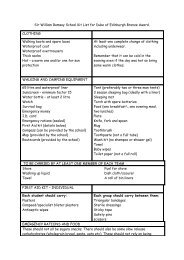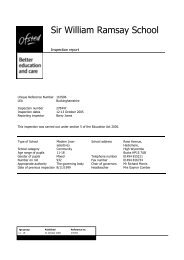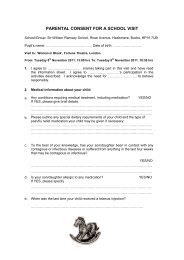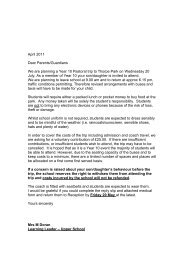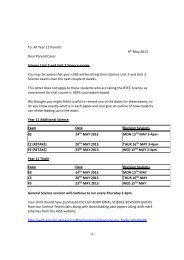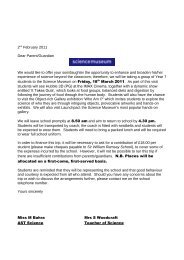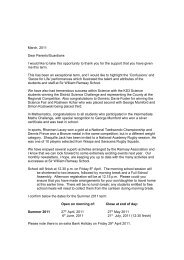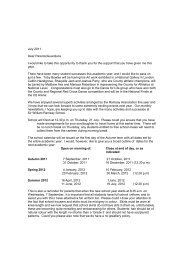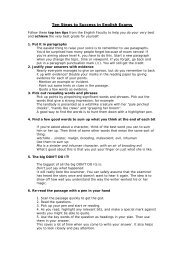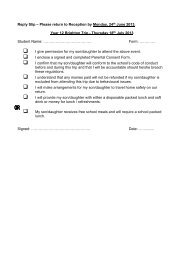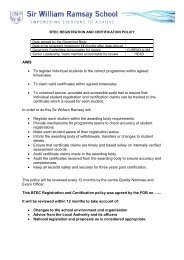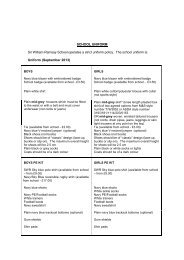Duke of Edinburgh's Award 2011
Duke of Edinburgh's Award 2011
Duke of Edinburgh's Award 2011
Create successful ePaper yourself
Turn your PDF publications into a flip-book with our unique Google optimized e-Paper software.
<strong>Duke</strong> <strong>of</strong> Edinburgh’s <strong>Award</strong><br />
<strong>2011</strong><br />
Information for Bronze Level<br />
Participants and their parents.
Items to be covered...<br />
• The <strong>Duke</strong> <strong>of</strong> Edinburgh’s <strong>Award</strong>.<br />
• The four sections at Bronze level.<br />
• The expedition.<br />
• Expedition equipment lists and how to<br />
find the items.<br />
• Questions
The <strong>Duke</strong> <strong>of</strong> Edinburgh’s <strong>Award</strong>.<br />
• For young people aged 14 – 24.<br />
• The programme can be completed at<br />
three levels; Bronze, Silver and Gold.<br />
• The programme promotes independence,<br />
confidence and gives young people the<br />
opportunity to develop new skills.<br />
• It is highly regarded by universities,<br />
colleges and employers.
The four sections at Bronze<br />
• Volunteering.<br />
• Skills.<br />
• Physical Activity.<br />
Level.<br />
• Expedition.<br />
• Students have already been placed into<br />
groups and should have had activities<br />
approved by staff members.
Information for students on<br />
Moodle.<br />
Student Room – D<strong>of</strong>E.<br />
• Group details<br />
• Meeting and training schedules<br />
• Information relating to sections<br />
• Kit lists
Volunteering, Skills and Physical<br />
Activity.<br />
• Students are expected to organise this for<br />
themselves.<br />
• Find an assessor (not family).<br />
• Create and work towards targets.<br />
• At least one hour a week for set time (e.g. 3<br />
months).
eD<strong>of</strong>E.<br />
• Students have been given registration<br />
packs.<br />
• Students must log on and enter details<br />
<strong>of</strong> their activities for these to be<br />
approved.<br />
• Evidence must also be uploaded.<br />
• Two sections MUST have been<br />
completed by July.
The Expedition.<br />
• One practice expedition<br />
• Two days <strong>of</strong> hiking and one night<br />
camping.<br />
• Training to be completed at school.<br />
• One assessed expedition. Approved<br />
<strong>Duke</strong> <strong>of</strong> Edinburgh assessors will be<br />
present.<br />
• Presentations.
After School Training.<br />
• To be held after school.<br />
• Will last for one hour.<br />
• Will cover:<br />
• Navigation<br />
• Campcraft<br />
• Food and cooking<br />
• First Aid.
Rules <strong>of</strong> <strong>Duke</strong> <strong>of</strong> Edinburgh<br />
Expeditions.<br />
• No motorised help!<br />
• Independent and self sufficient.<br />
• You must be properly equipped and be under<br />
the supervision <strong>of</strong> a responsible adult.<br />
• 4 – 7 people per group. Groups can be mixed<br />
but tents MUST be single sex.
The Practice Expedition.<br />
• Saturday 7 th and Sunday 8 th May <strong>2011</strong>.<br />
• Pick up, drop <strong>of</strong>f and overnight camping<br />
at the Stokenchurch Centre.<br />
• Letters and information will be sent<br />
nearer the time.
The Practice Expedition<br />
• Day One - hiking under direct<br />
supervision <strong>of</strong> staff.<br />
• Practising navigation skills.<br />
• Overnight camping.<br />
• Day Two – Teams will practise navigation<br />
skills under remote supervision.
Direct and remote supervision<br />
• Each team must plan and submit their<br />
route to Miss Jeffrey.<br />
• Areas which may be dangerous are<br />
highlighted. Route will be changed or<br />
direct supervision is required.<br />
• Remote supervision will be employed for<br />
the majority <strong>of</strong> expeditions.
Expeditions.<br />
• At least six hours <strong>of</strong> planned activity.<br />
• All equipment must be carried by<br />
students.<br />
• At least 3 hours <strong>of</strong> hiking, possibility <strong>of</strong><br />
small projects.<br />
• Must meet staff at the checkpoints.
Mobile phones and GPS.<br />
• Students should be able to navigate<br />
using compasses and maps to remain<br />
independent.<br />
• For the same reason, mobile phones are<br />
BANNED for most students.<br />
• Two fully charged phones per team in a<br />
SEALED ENVELOPE.
The assessed expedition.<br />
• Saturday 9 th and Sunday 10 th July <strong>2011</strong>.<br />
• Camping at Longridge (Marlow).<br />
• Only to be undertaken if students have<br />
performed well during the practice<br />
expedition.
The school will provide...<br />
• Maps<br />
• Compasses
Parents should supply...<br />
• Items on the kit list.<br />
• Transportation to and from pick up<br />
points (car sharing is advised).
Kit List.<br />
• Many items can be found at home.<br />
• Some specialist equipment can be hired<br />
from Bucks County Council through the<br />
school.<br />
• Many items can be bought cheaply if you<br />
hunt around.
Clothing.<br />
• Walking boots – MUST have ankle<br />
support.<br />
• NO trainers.<br />
• Wellies or flip flops may be worn at the<br />
campsite.
Waterpro<strong>of</strong>s.<br />
• Berghaus Goretex £200+<br />
• Millets or Blacks kag in a bag £10 - £15<br />
• BCC rented waterpro<strong>of</strong>s £1 per week<br />
• Jacket and trousers needed.
Appropriate clothing.<br />
• Nylon is better than cotton.<br />
• Fleeces and hoodies are ideal for<br />
keeping warm.<br />
• Wear lots <strong>of</strong> thin layers which can be<br />
easily removed.<br />
• Strappy tops are a very bad idea.<br />
• Wear two pairs <strong>of</strong> socks.<br />
• Make the most <strong>of</strong> what you have before<br />
buying specialist equipment.
Rucksacks.<br />
• 60 – 65 litres.<br />
• Should not carry more than ¼ <strong>of</strong> own<br />
body weight (eg 8 stone student = no<br />
more than 2 stones once packed).<br />
• Share equipment.<br />
• Ensure the rucksack is the correct back<br />
size.
Ways to minimise weight and fit<br />
it all in.<br />
• Don’t take too many toiletries.<br />
• Don’t take a full tube <strong>of</strong> toothpaste/roll<br />
<strong>of</strong> toilet paper etc.<br />
• Bring plastic plate and cutlery.<br />
• No canned or “wet” food.<br />
• Bring a small towel.
Food.<br />
• 1000 – 1500 extra calories per day.<br />
• Constant snacking is required.<br />
• Students must prepare a hot meal for<br />
dinner and carry their own food.<br />
• Students should cook in small groups.
Water.<br />
• Students MUST carry 2 litres <strong>of</strong> water.<br />
• Orange squash should be carried by at<br />
least one member <strong>of</strong> the group.<br />
• Plastic water bottles are fine.
Suitable food.<br />
• No meat or foods which can easily go<br />
<strong>of</strong>f.<br />
• Tins are heavy to carry. “Dry” foods are<br />
best.<br />
• Pasta and rice are ideal for dinner.<br />
• Students will need to plan their own<br />
meals.
Cooking your food.<br />
• Trangias can be rented from BCC.<br />
• Staff will hand over fuel at dinner time.
Other types <strong>of</strong> stove.<br />
• Fuel source MUST be resealable.
In emergencies...<br />
• Survival bag for each student.<br />
• Mobile phone.<br />
• Training will be given.
Medical conditions.<br />
• Students will not be banned from<br />
expeditions because they have a medical<br />
condition.<br />
• However, staff and students within the<br />
team MUST know about it in case there is<br />
an emergency.<br />
• Spare medication will be carried by<br />
members <strong>of</strong> the team and students will be<br />
trained how to use it during first aid<br />
sessions.
Questions.



